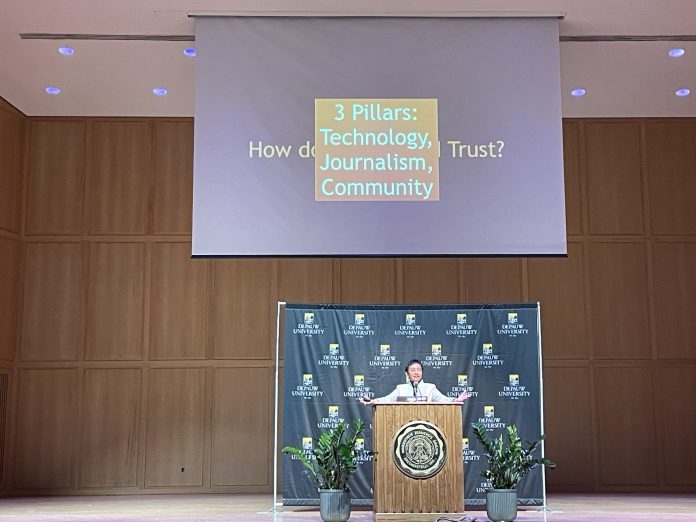
Maria Ressa, co-founder and CEO of Rappler and the first Filipino recipient of the Nobel Peace Prize, delivered the Timothy and Sharon Ubben lecture at DePauw on Wednesday, Nov. 2. Described as a person who “brings to light what some would rather keep in the dark” by English professor Eugene Gloria, Ressa presented her perspectives on the stakes of journalism in the digital age.
“How do we act as citizens in an age of exponential lies?” - Ressa posed the question. She said lies are spreading six times faster than facts due to the rise of social media. This situation distorts the truth, which in turn decreases trust, and ultimately destroys our sense of shared reality and democracy, according to Ressa. She compared this to living in an “upside down” world.
Ressa said the audiences still have the tendency to believe the first thing they see on the internet without fact-checking because “thinking slow never wins thinking fast.” While this tendency is biological, according to Ressa, it should be illegal for people and institutions on social media to manipulate the general audience in the first place.
Ressa attributed the “craziness” that social media brings central to the information system and said that by 2024, we will “elect more illiberal leaders more democratically” if the current information system stays the same. According to the National Democratic Institute Global Elections Calendar, there are 43 elections around the world scheduled for 2022. This number does not include the midterm election in the United States.
Ressa added that social media “commoditizes journalists,” citing examples of herself being harassed on social media because of the way she looks and talks. She described receiving “ninety hate messages an hour, 90 rape threats per minute” in an interview with Reuters in 2017.
“Women, LGBTQ [community], anyone who was marginalized before in the new world is further marginalized on social media,” Ressa added. She cited data from the International Center for Journalists showing 25% of women journalists have received threats of physical violence via social media.
In her presentation, Ressa discussed five lessons to fight the upside down world and the problematic information system. First, learn. She advised a Filipino student at DePauw to “learn everything you can and come home.” Second, speak, because silence is consent. Third, draw the line where “on this side, you are good, [and] it has to be that simple.” Fourth, develop trust by avoiding the “us vs. them” mindset, thinking slow, and growing our shared reality. Finally, have faith in the goodness of human nature.
“With trust, everything is possible. Without trust, nothing in possible,” Ressa said.
